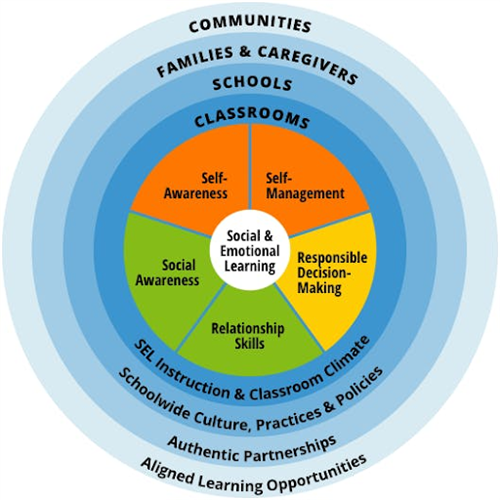-
Social and Emotional Learning (SEL) Is an Integral Part of Education and Human Development. SEL Is the Process Through Which All Young People and Adults Acquire and Apply the Knowledge, Skills, and Attitudes to Develop Healthy Identities, Manage Emotions and Achieve Personal and Collective Goals, Feel and Show Empathy for Others, Establish and Maintain Supportive Relationships, and Make Responsible and Caring Decisions.
SEL Advances Educational Equity and Excellence Through Authentic School-family-community Partnerships to Establish Learning Environments and Experiences That Feature Trusting and Collaborative Relationships, Rigorous and Meaningful Curriculum and Instruction, and Ongoing Evaluation. SEL Can Help Address Various Forms of Inequity and Empower Young People and Adults to Co-create Thriving Schools and Contribute to Safe, Healthy, and Just Communities.
(CASEL -Collaborative for Academic, Social and Emotional Learning, 2020)
For more information, visit: www.casel.org
-
The CASEL 5 addresses five broad and interrelated areas of competence and highlights examples for each: self-awareness, self-management, social awareness, relationship skills, and responsible decision-making.
The CASEL 5 can be taught and applied at various developmental stages from childhood to adulthood and across diverse cultural contexts. Many school districts, states, and countries have used the CASEL 5 to establish preschool to high school learning standards and competencies that articulate what students should know and be able to do for academic success, school and civic engagement, health and wellness, and fulfilling careers.
A developmental perspective to SEL considers how the social and emotional competencies can be expressed and enhanced at different ages from preschool through adulthood. Students’ social, emotional, and cognitive developmental levels and age-appropriate tasks and challenges should inform the design of SEL standards, instruction, and assessment. Given that, stakeholders should decide how best to prioritize, teach, and assess the growth and development of the CASEL 5 in their local schools and communities. (Casel.org)



